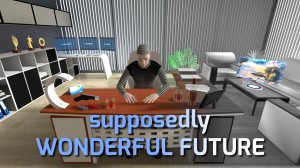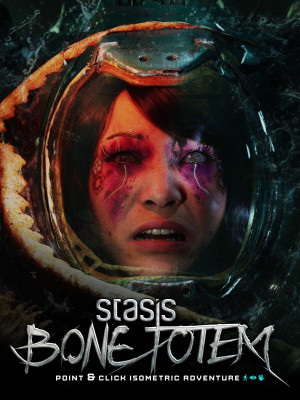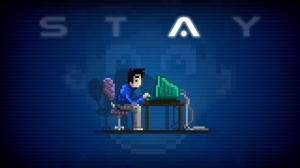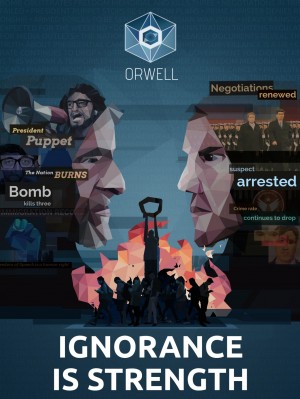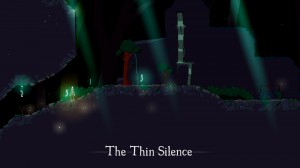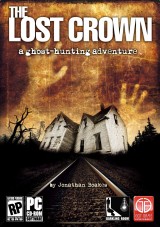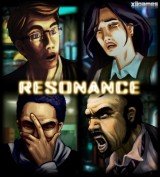Review for Supposedly Wonderful Future

On any checklist of ideas that make for an entertaining science fiction adventure, Dmitry Zagumennov’s Supposedly Wonderful Future surely would tick quite a few boxes. A chance to travel through time to a utopian future – check; virtual immortality achieved through advanced scientific means – check; a story full of moral choices presented through well-thought-out and detailed writing – check. These ingredients should, by all accounts, set the stage for a wonderful gaming experience. Supposedly.
The trouble with Supposedly Wonderful Future lies not in the ideas it brings to the table, but in what it asks the player to do with them and how that results in the entire experience simultaneously being both somewhat shallow and pretentious, and ultimately unfulfilling. Things start out promisingly enough, but the game frequently gets in its own way by design, cutting off potentially interesting narrative paths and rerouting the player to something totally unrelated all the way up until the final credits roll.
Players initially find themselves in present-day, with a man named Michael reporting to his mundane office job at his own fledgling start-up company. Within moments, his life takes a sharp detour as there’s a knock on his office door from Jackie, a lady who claims to be from the year 2048 and swiftly proposes to take Michael with her to her own time. Though only thirty years into the future, this new society has solved the issue of mortality via a procedure that allows citizens to virtually live forever, while Michael himself, as he’s told, won’t live long enough to see this come to pass. She offers him the chance to decide, once he’s seen the future, whether he’d like to stay and enjoy the fruits of immortality or return to his own life. The catch is that he must first help solve a string of problems posed to him, no questions asked.
These problems represent the entirety of the game’s five-part structure from here on out, which is the main reason it fails to work as a rewarding narrative experience. It isn’t apparent at first, not until perhaps the end of the second proper chapter, but each of the five problems Michael is asked to solve is a story that lives in its own bubble, completely independent of the others. The nice thing about each scenario being its own distinct animal is the sense of being thrust into a brand-new situation each time, but the downside is that they never even relate to the protagonist’s overarching story.
Every issue you confront can be boiled down to a choice, usually a moral one, between two or more options at the end of the chapter. Each segment is therefore essentially spent working through dialog trees until the final choice is presented, sometimes digging through additional data if you so choose to make the choice you deem right. That’s it; there’s nothing else to it – no puzzles, no consequences, no payoff. Not even an indication of how smart or foolish the selected choice was, whether it was right or wrong, or what happened as a result of it. For Michael, each chapter ends after his decision is made, with the next introducing a brand-new, completely unrelated scenario.
There’s certainly nothing wrong with asking players to make their own moral choices. But it is difficult to place much value on the weight of these decisions when neither they nor their self-contained situations are ever mentioned again. A particular case – one where I was asked to spend a considerable amount of time painstakingly poring over personal profiles, internet chat records, video transcripts, and so on in order to identify which of several suspects had committed online identity theft – ended with me making a semi-random accusation, as I simply didn’t have enough decisive evidence. This was frustrating, not only because I was unable to make a choice I felt the least bit confident about, but even more because nothing about the case – which presumably impacted at least one unlucky suspect’s life greatly – was ever brought back up again. The game simply continued on to the next story, without even the slightest clue of whether I had chosen correctly or sent an innocent man behind bars. Moral dilemmas are fine, and I’m all for living with my in-game decisions, but that does imply some level of consequence, either for my character or others around him, which Supposedly Wonderful Future crucially lacks.
That isn’t to say the experience is vapid by any means. This is essentially a first-person visual novel, with players progressing through conversations, choosing dialog topics and response variations, and occasionally clicking items on-screen to interact with them. It takes mere moments in the prologue to recognize the quality of the writing. The prose flows well, and the author uses it to paint comprehensible visuals in your mind. Great effort has also been made to not shy away from the ethically questionable and philosophical sides of things, giving players some real food for thought to chew on.
One chapter sees you attempt to settle a dispute that’s driving a family apart, while another has Michael enter virtual reality to verbally feel out an uninvited visitor. Between them the entire experience is quite wordy, taking anywhere from about 5-8 hours to complete – about an hour or two per chapter, depending on whether you are looking to exhaust every possible topic.
While the occasional challenge in the text is welcome in terms of sustaining interest during the individual chapters, it feels like it missed the mark in another way entirely. Having been brought into this utopian future society, I was desperate to really feel immersed in the game world, and this just never crystallized, although some attempts were clearly made. After each of the first four chapters, it’s possible to peruse online newspaper articles about a range of topics and events. While these are, again, fairly lengthy pieces, each article exists in a vacuum similar to the chapter scenarios themselves, like reporting on a retro-themed night club or the dangers of futuristic mega corporations. In the end, even this lacks cohesion, and the separate pieces never coalesce to give you a deeper sense of the world as a whole.
The high degree of effort exhibited in the writing is a good thing, as the game’s indie budget was clearly quite limited. Most chapters take place across just two or three scenes, with a small handful of interactive objects in each. Scenes are predominately static, with perhaps a few character or environmental animations added. Usually only what’s necessary is shown, in some cases using real-life stock photographs or a panoramic city skyline outside of a window. The VR chapter resorts to layering its text boxes over what appears to be a random pattern generator for its duration, while another takes place exclusively at a solitary desk floating in a pool of light surrounded by darkness. While living spaces are at least decorated to look the part, nothing about the graphics capitalizes on the utopian setting in any meaningful way. What little we see of each setting is bland and plastic and devoid of any character that could have enhanced the sense of a futuristic society.
Music fits the same bill: limited but certainly serviceable, with different tracks playing over the course of the various chapters, mostly creating an unobtrusive backdrop for the required reading. One notable exception to this, and almost reason enough for me to turn the music off entirely, is the atrocious, busy, disharmonious score played during the prologue, which really should have been one of the game’s calmest moments. Voicework, understandably for a script-heavy experience, is entirely absent from this game.
Production values are easy to overlook in cases where the story and gameplay make up for them, but Supposedly Wonderful Future falls short of delivering a memorable experience. Not because the actual gameplay is largely restricted to reading on-screen text and making dialog choices, but because, even as a visual novel, there’s a distinct lack of connection between its parts. Instead, this is more of an anthology of unrelated stories that fail to add up to a solid narrative. But the largest shortcoming lies in the fact that, even after all the choices I was asked to make throughout, I still don’t have any sense of consequences for my actions, or whether my intuition led me to the best or right decision. When you don’t know why or how any of your decisions actually matter in a game based purely on posing moral dilemmas, you can’t help but be left feeling unfulfilled and underwhelmed by a story that seemed to offer so much promise.


